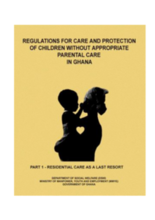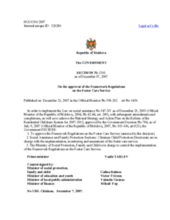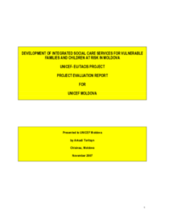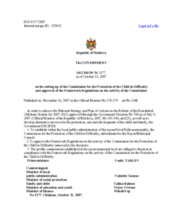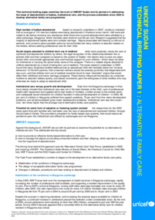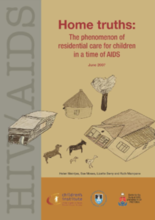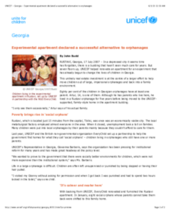Displaying 1381 - 1390 of 1510
These standards were drafted as part of a reform initiative programme in Ghana to ensure that institutional care is used as a last resort
On 13 February 2008 Prime Minister Kevin Rudd made a formal apology to Australia’s Indigenous peoples, particularly to the Stolen Generations whose lives had been blighted by past government policies of forced child removal and Indigenous assimilation.
The study reported by Shihning Chou and Kevin Browne explored the link between institutional care for young children and international adoption, using a survey of 33 European countries. The evidence suggests that, rather than reduce the number of children in institutions, international adoption may contribute to the continuation of this harmful practice. A child rights-based approach to providing alternative care for children separated from their parents is proposed.
Decision No. 1361 on the approval of the Framework Regulations on the Foster Care Service was enacted by the Government of the Republic of Moldova on December 21, 2007 in order to implement the Law on social assistance (No 547-XV as of December 25, 2003) as well as to achieve the National Strategy and Action Plan on the Reform of the Residential Childcare System for 2007-2012, approved by Government Decision No 784, as of July 9, 2007.
Project Evaluation Report for UNICEF Moldova
On 31 October 2007, the Government of the Republic of Moldova issued Decision No. 1177 on the setting up of the Commission for the Protection of the Child in Difficulty and Approval of the Framework Regulations on the activity of the Commission.
Examines the work of UNICEF Sudan and its partners in addressing the issue of abandonment of babies, institutional care, and the process undertaken since 2003 to develop alternative family care programmes.
A report on residential care in South Africa in the context of AIDS and an under-resourced social welfare sector.
In Georgia, UNICEF and EveryChild have teamed up to place children in need of alternative care in small, supervised apartments as an alternative to orphanages.
The aim of this report is to review international human rights norms as well as Liberian legislation, and to assess the compliance of orphanages with those standards.

